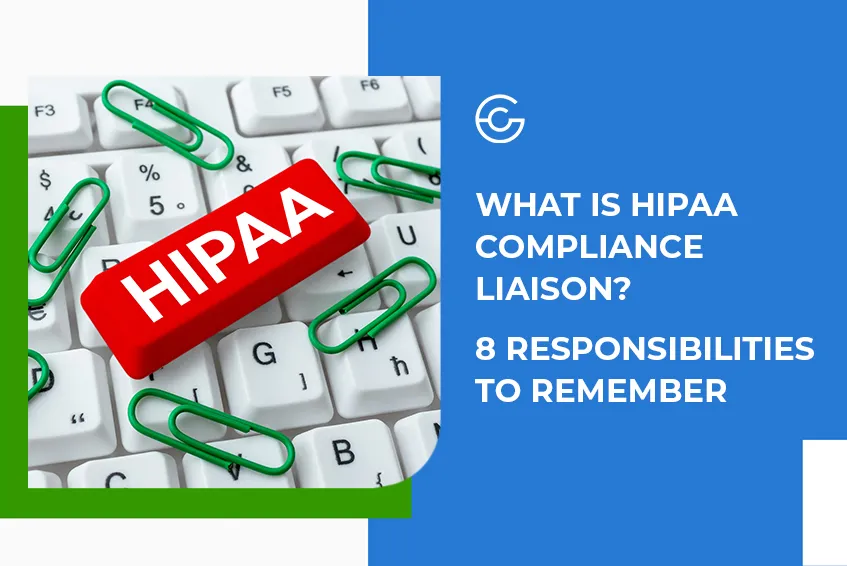
The Health Insurance Portability and Accountability Act of 1996 (HIPAA) is a national law. Its set standards and policies ensure that sensitive health information remains protected and never exposed without a patient’s consent.
Every individual has the right to control how their health information is handled and who can have access to their records.
However, not everybody in the healthcare industry is well-versed in this law. For this reason and more, a HIPAA compliance liaison is a much-needed asset.
What is HIPAA Compliance Liaison?
A HIPAA compliance liaison is an individual in the healthcare organization assigned as the first point of contact when anyone has privacy-related questions. HIPAA is a law with many provisions, and the definition of protected health information (PHI) is quite broad.
All institutions collect patient information and are responsible for ensuring that this data isn’t disclosed to anybody without the owner’s consent. The HIPAA compliance liaison must be on top of the privacy policies.
Any person, business, or organization that handles PHI must follow the protocol on privacy and security of information. When they need clarification on certain provisions, the HIPAA compliance liaison provides it.
Understanding the HIPAA Compliance Liaison
There are two major HIPAA policies:
- HIPAA Privacy - guidelines on how health information must be protected through the Standards for Privacy of Individually Identifiable Health Information
- HIPAA Security - policies for protecting health information stored in electronic form through the Security Standards for the Protection of Electronic Protected Health Information
The HIPAA compliance liaison has to be well-versed in both because modernization has widened the policy coverage. Electronic processing is currently more popular in the industry, and the issues of possible breach and disclosure of PHI and e-PHI are more complex. Understanding HIPAA must be ingrained in the liaison’s expertise.
PHI or e-PHI data is any individually identifiable health information, such as:
- Name
- Address
- Birth date
- Phone number
- Email address
- Social Security number
- Medical record number
- Health plan beneficiary number
- Account number
- Certificate/license number
- Vehicle identifiers
- Device identifiers and serial numbers
- Web URL
- IP address
- Fingerprint
- Photo
- Other unique identifier code
Most of these are outlined in a patient’s record with any healthcare provider. All facilities must ensure that this data will not be compromised in any way.
The patient can ask the HIPAA compliance liaison for a notice of privacy practices (NPP). It is a document that informs patients of their right to privacy and how PHI can be used and disclosed.
The patient may also ask the liaison to explain the policy to them. This is a perfect liaison role example as they are tasked with making the technicalities of HIPAA policies more understandable to regular people.
Entities Covered By HIPAA
 Who needs to follow HIPAA compliance? Any organization obliged to comply with HIPAA Privacy and Security are called covered entities. They are as follows:
Who needs to follow HIPAA compliance? Any organization obliged to comply with HIPAA Privacy and Security are called covered entities. They are as follows:
Health Plans
Organizations that offer health plans, such as insurance companies, health maintenance organizations, and government programs like Medicare and Medicaid, must safeguard all patient information.
Healthcare Providers
Most healthcare providers with electronic business processing like billings and claims are considered covered entities. They are doctors, dentists, psychologists, chiropractors, clinics, hospitals, pharmacies, and nursing homes.
Healthcare Clearinghouses
Some healthcare providers partner with a third-party financial institution to process payments electronically. Because they have access to some PHI and e-PHI, they need to abide by HIPAA rules.
The Importance of HIPAA Compliance in Healthcare
Why is HIPAA important to patients? Health information is sacred and personal, so only the patient has the right to have such knowledge. They deserve to maintain agency over who can access that information.
More importantly, HIPAA compliance is important because it gives patients peace of mind that healthcare providers, facilities, and organizations are required to keep PHI confidential as well.
HIPAA compliance is a matter of federal law. Organizations could lose their business licenses if they are found negligent and in violation of policies. This leads to lost client trust and credibility that may be difficult to recover from.
A business falling into the hands of hackers or cybercriminals may cost it millions of dollars. Global hacking damage in 2021 was pegged at $6 trillion.
Hackers may take control of PHI within a covered entity’s responsibility and threaten the organization of disclosing them unless they pay up. Some may use malicious software to keep patient records hostage until the institution caves into the criminals’ demands. Either way, it’s a financially damaging situation.
Investing in efficient and HIPAA-compliant software like ClaimGenix may prevent such situations. Having a responsible and highly cognizant HIPAA compliance liaison is also a tremendous benefit.
Role and Responsibilities of a HIPAA Compliance Liaison
 A HIPAA compliance liaison is responsible for ensuring the organization or covered entity follows all provisions.
A HIPAA compliance liaison is responsible for ensuring the organization or covered entity follows all provisions.
What are their specific responsibilities?
- Develop and enforce policies to comply with HIPAA Policy and HIPAA Security.
- For large institutions, the liaison can appoint compliance officers for HIPAA-related tasks.
- Train employees on processing healthcare reports while complying with HIPAA regulations.
- Establish communication channels accessible to all patients. Clear communication is vital to understanding HIPAA.
- Monitor and audit internal HIPAA compliance and adjust policies accordingly.
- Identify potential breaches and respond to them appropriately.
- Continually assess and evaluate HIPAA-related policies and amend them when needed.
- Institute the use of HIPAA-compliant software like ClaimGenix.
There are no specific requirements for becoming a HIPAA compliance liaison. However, mastery of HIPAA Privacy and Security policies is a basic need for the position.
Conclusion
There is no expiration to HIPAA compliance. It is ongoing, and policies may be amended with continuing changes in technology. Having a reliable HIPAA compliance liaison will ensure organizations stay dutiful to federal laws.
It also helps when the company has proficient medical insurance billing software that is HIPAA-compliant, secure, and easy to use. Get a ClaimGenix demo here

